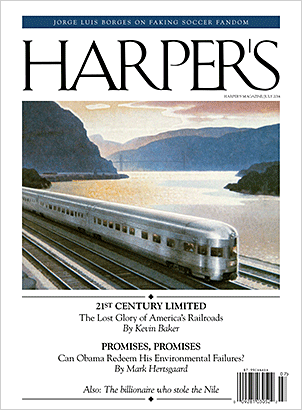Introducing the July 2014 Issue
Kevin Baker on the lost glory of America’s railroads, Mark Hertsgaard on Obama’s environmental failures, Sarah Menkedick on why Mexican immigrants are moving back home, and more
 In this month’s cover story, Kevin Baker, who last wrote for the magazine in the October 2012 issue (“Why Vote?”), crisscrosses the United States at the same time the Republican right was preparing to shut down the federal government. Starting at New York City’s Penn Station, whose previous, long-demolished iteration once represented the zenith of American industrial design, Baker travels via Amtrak from the East Coast to the West Coast and back again. For the entire nineteenth century and much of the twentieth, the railroad linked small towns across the country to the wider world. It literally embodied Ezra Pound’s famous phrase, “Transportation is civilization.” No wonder we used to value our trains and so many people took pride in riding them. Today, however, plans for improving or even maintaining the rail system are met with apathy, if not opposition. Passing through (and relishing) the American landscape, comparing notes with other travelers and railroad fanatics, Baker ponders the now-decaying industry that once provided a literal track for America’s expansion.
In this month’s cover story, Kevin Baker, who last wrote for the magazine in the October 2012 issue (“Why Vote?”), crisscrosses the United States at the same time the Republican right was preparing to shut down the federal government. Starting at New York City’s Penn Station, whose previous, long-demolished iteration once represented the zenith of American industrial design, Baker travels via Amtrak from the East Coast to the West Coast and back again. For the entire nineteenth century and much of the twentieth, the railroad linked small towns across the country to the wider world. It literally embodied Ezra Pound’s famous phrase, “Transportation is civilization.” No wonder we used to value our trains and so many people took pride in riding them. Today, however, plans for improving or even maintaining the rail system are met with apathy, if not opposition. Passing through (and relishing) the American landscape, comparing notes with other travelers and railroad fanatics, Baker ponders the now-decaying industry that once provided a literal track for America’s expansion.
President Obama has just unveiled new EPA regulations to limit the emission of greenhouses gases from the nation’s power plants, his most high-profile attempt to combat climate change since taking office. Yet his environmental record has been decidedly spotty, especially for a man who promised to halt the rising of the oceans during his acceptance speech in 2008. In “Promises, Promises,” Mark Hertsgaard examines those failures — many of them stemming from the president’s eagerness to accommodate Big Oil and other key energy-industry players — and considers Obama’s potential to redeem that record.
In the debate over immigration reform, few consider the possibility that recent immigrants can become dissatisfied with their choice to move here. The number of Mexican immigrants bound for the United States doubled in the 1980s and again in the 1990s; in the poverty-stricken Sierra Norte, villages nearly emptied of their young men. Yet by 2012, net migration to the United States from Mexico had dropped to zero. What has changed? Sarah Menkedick travels to the village of San Pedro Cajonos, in Oaxaca, to take part in its annual fiesta and talk to residents who have recently given up on the so-called American dream and returned to their rural hometowns.
In 2013, photographer Kirsten Luce accompanied local law-enforcement officers in Texas on raids of houses where migrants are stashed by smugglers after crossing the Rio Grande. Her moving and sometimes disturbing photographs are a record of lives in limbo — and proof that El Norte retains its allure for a substantial number of people in Latin America.
While doing research for The Most Dangerous Book: The Battle for James Joyce’s Ulysses, Harvard lecturer Kevin Birmingham found, in one of Joyce’s letters, a cryptic reference to the author’s experience with an early twentieth-century drug called galyl, whose only purpose was to treat syphilis. Birmingham suspects that Joyce may have contracted the disease during one of his many visits to Dublin’s red-light district in 1904. In this month’s Annotation, he examines Joyce’s medical record and finds new evidence for the diagnosis.
In “The Man Who Stole the Nile,” Frederick Kaufman follows the trail of an Ethiopian billionaire who is planning to export tons of rice to Saudi Arabia as his countrymen go hungry. On his adventure through Ethiopia, Kaufman encounters shady businessmen and corrupt politicians and tries to get to the bottom of one man’s control of the country’s agricultural resources.
Also in this issue: New fiction by Jess Walter; Simon Kuper and Jorge Luis Borges on the beautiful game; a play by Benjamin Kunkel; Francine Prose on Karl Ove Knausgaard; and Christopher Cox on the temptations (and disappointments) of politics as a career.


